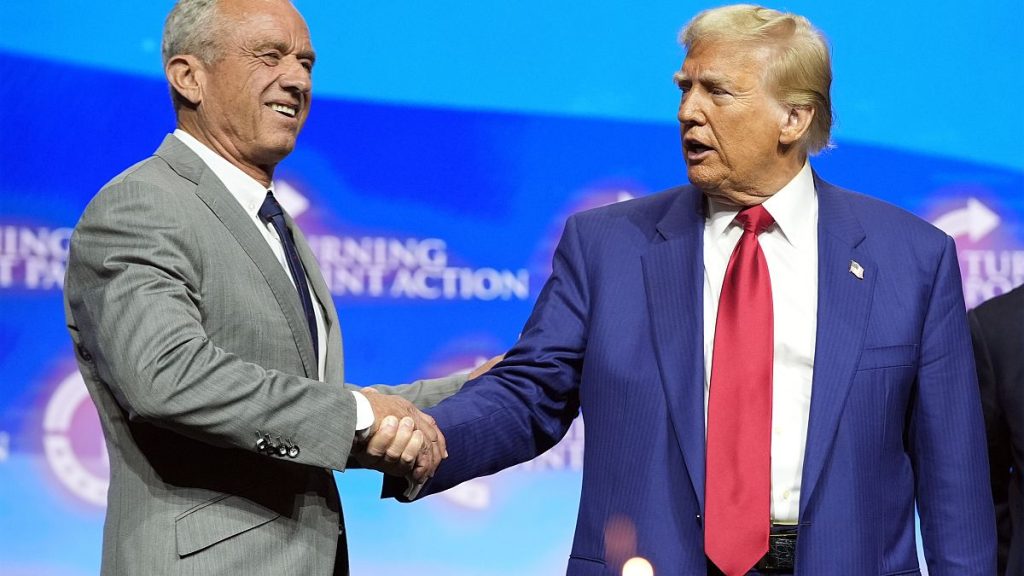In the context of Donald Trump’s anticipated second term as President of the United States, public health has emerged as a pressing topic amid widespread changes that could have global ramifications. In this increasingly complex political landscape, Trump has aligned himself with Robert F. Kennedy Jr., a renowned vaccine skeptic and environmental lawyer, to potentially transform the approach to U.S. health policies. Trump has encouraged Kennedy to advocate for radical reforms aimed at tackling issues within federal health agencies, expressing a desire to root out corruption, restore evidence-based practices, and address chronic disease within a two-year timeframe. The implications of this partnership extend far beyond U.S. borders as proposals for reform can influence public health policies globally, challenging established standards in healthcare.
One core element of Trump’s potential reforms is the accessibility and regulation of medicines and vaccines, given his proposal for a 10 percent universal tariff on imports. This tariff could disrupt global supply chains for pharmaceuticals and related raw materials, particularly affecting the European Union where a significant portion of drug imports originates from the U.S. Experts warn that amidst existing supply chain vulnerabilities, such tariffs could exacerbate shortages and inflate costs, thereby impacting public health outcomes both domestically and internationally. However, the outcome of these proposals remains speculative as their actual implementation will depend on the evolving political dynamics once Trump officially resumes power.
Trump’s commitment to cutting funding for the National Institutes of Health (NIH), which is crucial for conducting medical research, poses another major concern. This agency has been pivotal in funding the development of breakthroughs such as the mRNA vaccines for COVID-19. Such cuts could hinder the global production of evidence-based medicine and research, potentially shifting more clinical trials and projects to Europe and Asia. The ramifications of reduced support for NIH are particularly alarming as it undermines the U.S. reputation as a leading research hub, which could have persistent effects on global health advancements and drug development.
Kennedy and Trump’s disregard for existing FDA regulations raises questions about the integrity of the U.S. medical regulatory framework. Kennedy’s ambition to eliminate the “revolving door” between the FDA and the pharmaceutical industry, coupled with Trump’s history of purging federal workers, poses a serious threat to the agency’s long-standing role as a trusted authority in medicine and vaccine safety. Should the FDA’s standards diminish due to political influences, the European Medicines Agency and other international counterparts might need to step up, which could shift the locus of pharmaceutical governance and decision-making to other regions.
The U.S. Centers for Disease Control and Prevention (CDC) could also face significant setbacks under Trump’s renewed administration, particularly in their capacity to monitor and respond to infectious diseases. The CDC has been crucial during outbreaks such as H5N1 bird flu, but political maneuvering and cuts in funding could undermine its effectiveness. Experts stress the importance of global collaboration in disease surveillance, and a diminished U.S. role in these efforts could hinder preparedness for future pandemics. Emphasizing the need for a strong, coordinated response to global health threats, voices within the health community express concern regarding what these changes mean for collective health initiatives worldwide.
Lastly, Trump’s escalating vaccine skepticism and potential policy changes could influence public perception of vaccinations, not just in the U.S. but also in Europe and beyond. His threats to cut federal funding from states mandating vaccines have already stirred apprehension among public health officials about increasing vaccine hesitancy. If rhetoric continues to empower skepticism towards vaccines, it could lead to a dangerous decline in immunization rates, giving rise to preventable diseases. Health experts have voiced the urgent need to counter this trend with evidence-based information, as fewer vaccinations could ultimately contribute to higher rates of morbidity and mortality for diseases that can be easily prevented through immunization.
While Trump and Kennedy’s joint strategy articulates ambitious health agendas that promise significant changes, the resulting uncertainties present a complex tapestry of challenges for U.S. public health policy that resonate internationally. As these plans unfold, the global health community remains vigilant, striving to safeguard health advancements while navigating a landscape marked by unpredictability and potential disruption.














